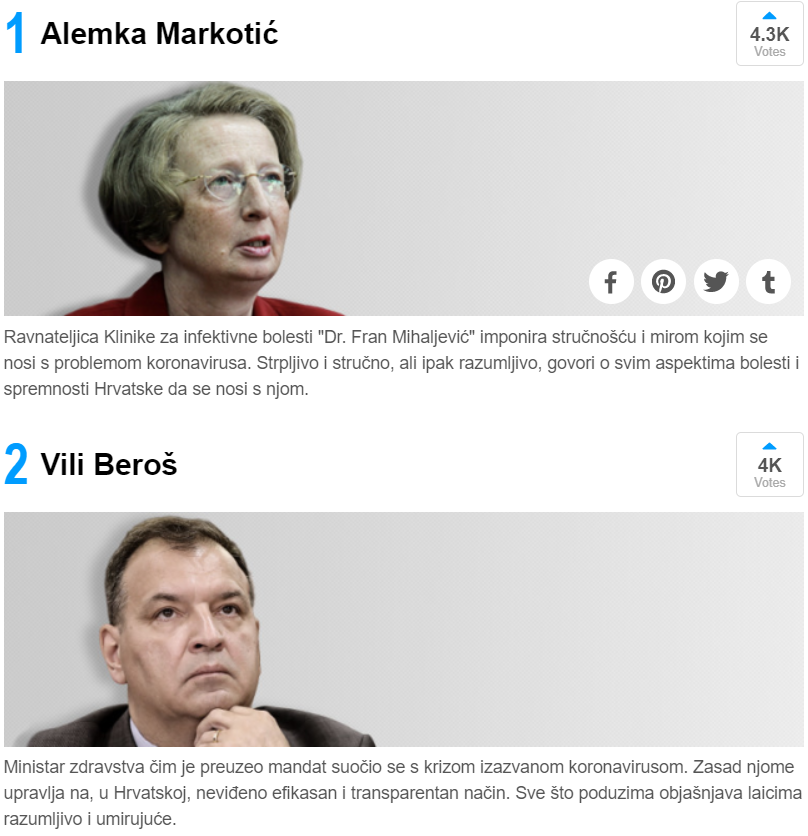Split's Le Meridien Lav Closes Doors, Decides to Keep All Staff
Coronavirus is sweeping through the world, and the Croatian tourism industry is taking a hit. One of Split's most beloved hotels, Le Meridien Lav, has now made the responsible decision to close its doors.
As Poslovni Dnevnik writes on the 18th of March, 2020, despite the closure and the incredibly uncertain business situation caused by the global COVID-19 pandemic, Split's Le Meridien Lav hotel is determined to retain all of its employees.
Following the guidelines of the World Health Organisation (WHO) for Combating Coronavirus (COVID-19) and the proposals of the National Institute of Public Health and the Civil Protection Headquarters, primarily focusing on the safety and health of its guests and employees, the Le Meridien Lav Hotel in Split has decided to officially close its doors.
The hotel closes in this first phase between Monday the 23rd of March and the 15th of Apri,l 2020, noting that the hotel management will monitor the development of this unexpected situation and make future decisions accordingly.
"Responsible business, which is to put the health of our guests and employees first, has encouraged us to make the decision to close the hotel. Despite the huge losses we're already seeing because of the cancellations from guests, congress' and poor booking for the upcoming season, we consider this the only right decision. We're determined to retain all of our employees who work at the hotel. We'll do our best to keep it that way,'' read a statement from Le Meridien Lav.
The hotel closed its luxury RE:CUPERA Wellness & Spa today. All future decisions will be made depending on the development of the coronavirus situation and depending on the challenges that the management of the hotel faces in the quickly approaching tourist season.
Le Meridien Lav is the only five star resort in the Split area, located in Podstrana, eight kilometres south of the City of Split. Le Meridien Lav boasts 381 units and a total of eleven state-of-the-art conference rooms covering an area of 2,500 square metres. Since back in 2015, it has been owned by the private Czech equity fund Odien Group, more specifically its subsidiary Odien Hotels N.V.
Make sure to follow our dedicated section for rolling information on coronavirus in Croatia.
The Realities of Self-Isolating on Hvar, Croatia's Premier Island
March 18, 2020 - Everyone has their own coronavirus story, but what is it like self-isolating on Hvar, Croatia's premier island?
Where are you spending the next two months?
As the realities of the coronavirus crisis started to hit home more and more in Croatia, the mood changed very quickly from corona memes and very relaxed attitudes to taking things very seriously. While the number of cases in Croatia remains very low, with no reported deaths at time of writing, the closing of cafes and restaurants in Istria was one dramatic move which helped to focus attention, and suddenly streets, bars and restaurants all over the country were almost empty. Schools closed for two weeks initially, and the prospect of an extended period of self-isolation looms. With no school and no tourist bookings, we took a family decision that rather than being cooped up in the house we rent in Varazdin, it would be preferable to go and self-isolate on Hvar, at our place in Jelsa.

Croatia's premier island in mid-March, a time when it would be traditionally waking up for the season, but not this year. Along with the rest of the country's tourism sector, Hvar faces a tough tourism future in the short term. Living there would have its advantages and disadvantages. Whatever shortages come to shops on the mainland, they will be a lot worse on the islands. But if one can prepare oneself mentally for that, there are many, many advantages. The sun, the nature, the tranquillity. We were making the right decision, weren't we? I wondered to myself as the ferry left Drvenik for Sucuraj. This would be the last glimpse of the mainland for some time.
The look on the kids' faces as we hit the coast on the drive down convinced me we had made the right choice. Windows opened, sea air inhaled.
"I just love the smell of our island, Daddy. I have really missed this."

Restaurants would be closed, and many of the trappings of city living unavailable, but one of the great plus points of life on the island would be access to the freshest home-grown field from the family garden. My father-in-law is a legend with his field, and his toil provides much of the food on the family table. We had brought seeds with us, and more stuff was planted today.
And what a delicious welcome! Some staples such as meat may soon be in short supply, but there will be food available from the field.
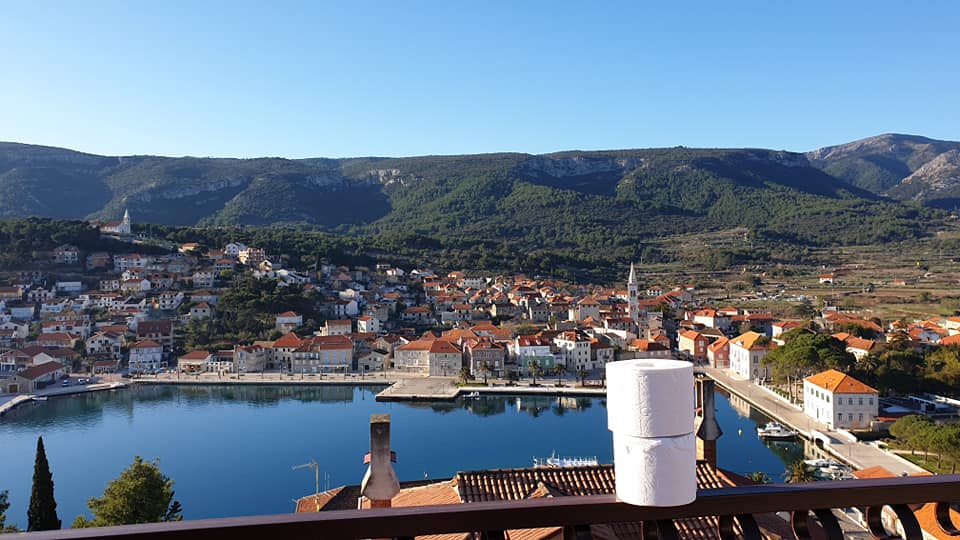
One definite advantage is the morning view! Sunshine and coffee on the terrace - one of the benefits of self-isolation on Hvar. I wrote a (what was intended to be a lighthearted) piece on the toilet paper situation yesterday, including the fact that we had decided not to panic buy in the mainland supermarkets, but rather go with the flow (so to speak) and adapt if there are shortages.
As I have not interacted with anyone physically since coming back or been to the supermarkets, I cannot give you a first-hand account of supplies. One neighbour said that meat, carrots and toilet paper were not to be found, while another friend found plenty of toilet paper in Stari Grad, but no milk, flour or onions. As with everywhere, I suspect, the situation will fluctuate. Dalmatians are a lot more conditioned for self-reliance than fat Irishmen, and they also have the recent experiences of the Homeland War to draw on. In a weird way, I am kind of looking forward to the impending hardship, as it will make me a tougher and better person. I am certainly looking forward to the Croatian solidarity - no nation is better at coming together in a time of crisis.
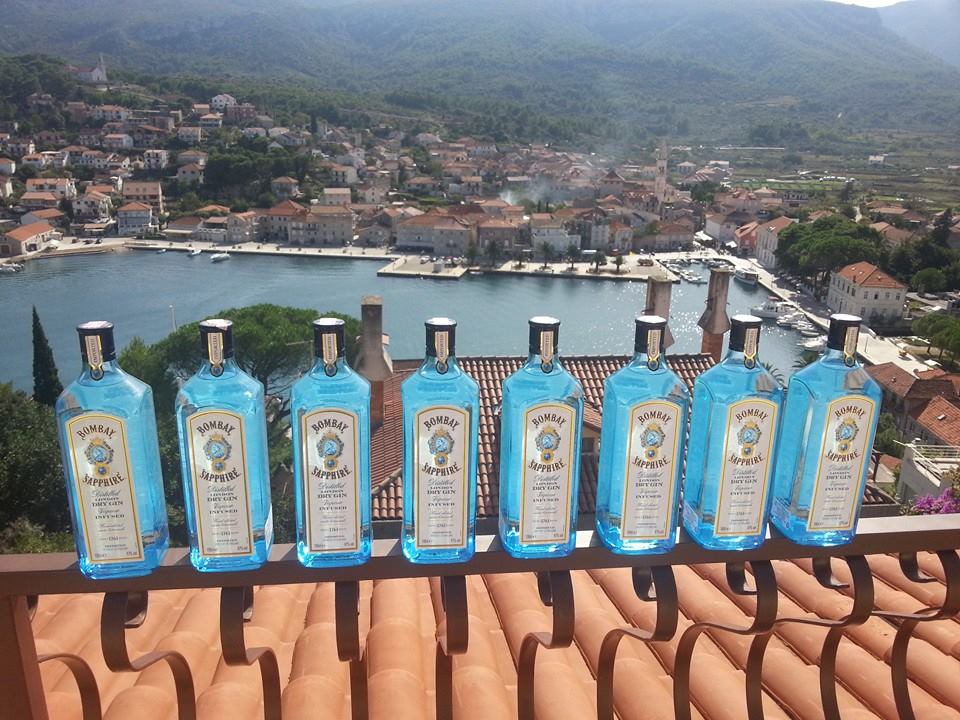
I have decided on self-isolation on Hvar without stocking up on alcohol. I look wistfully as one of my favourite photos in life, the Bombay gin terrace of 2012 and my current Facebook cover photo, but those bottles emptied a long time ago. Perhaps this self-isolation on Hvar is a chance for lifestyle reflection.
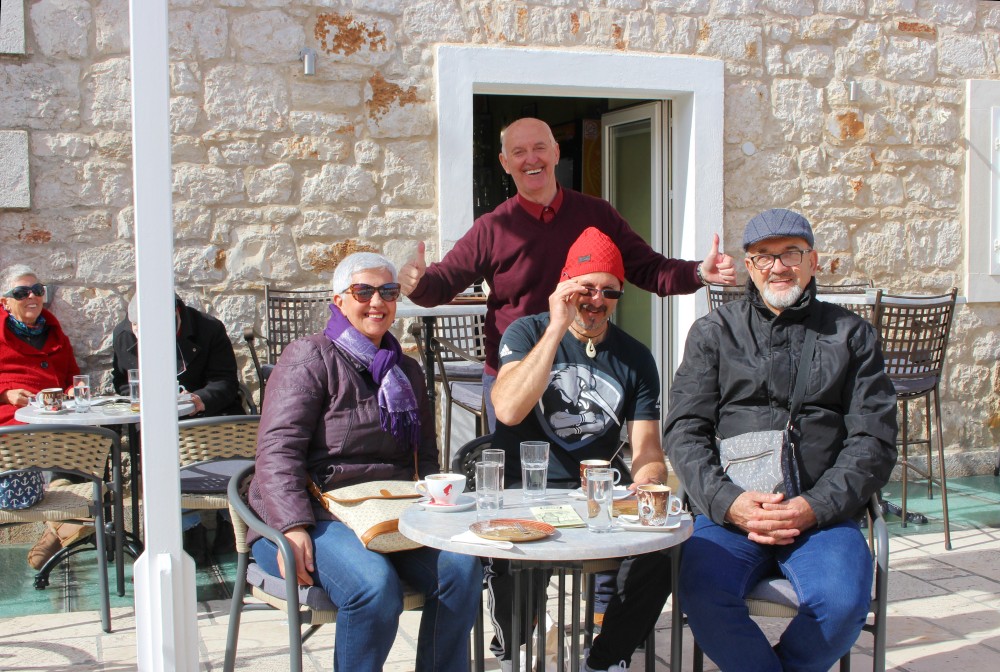
(Photo credit Vivian Grisogono)
Not that life is without temptation. I can see The Office is still open on the main square (this photo from a couple of weeks ago - thanks Viv), and there is nothing I would rather do than slip down for a midday cold one or three in the sun, as was part of my daily routine for years. But my greetings to Captain Nijaz and the team will have to wait.
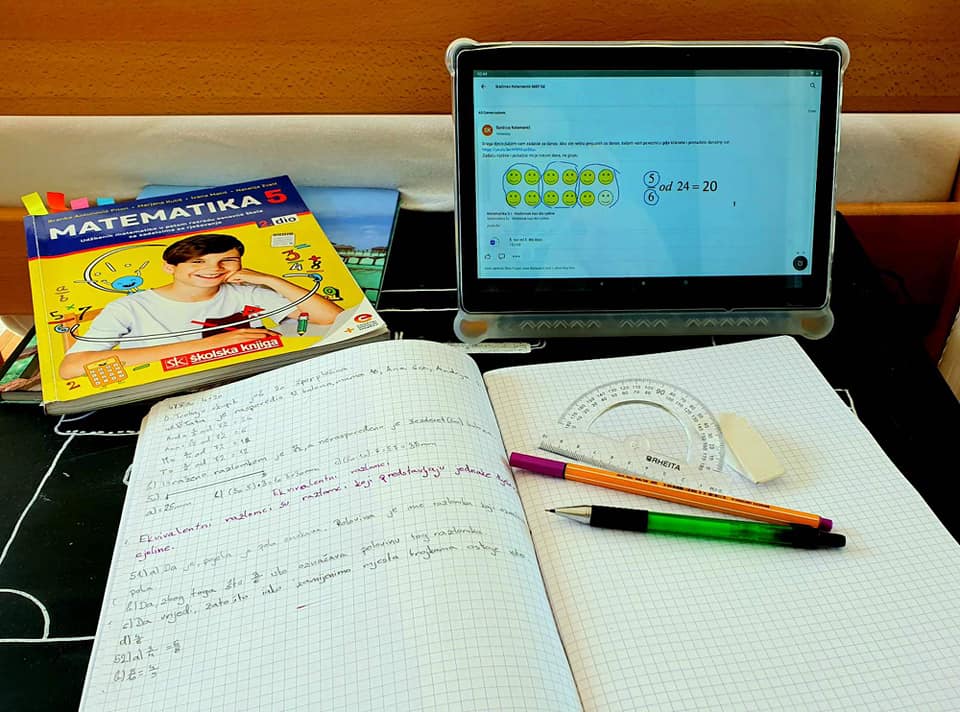
I was curious to see how remote schooling was going to work, and how the kids would take to it. There were system server issues on the first day, but things seem to have settled down, and they are diligently at their tablets doing their chores, as well as following the classes on television. I was not that optimistic that the whole thing would work, but it seems to be working very well, backed up by Viber group chats with the teachers. And this is a country where homeschooling is illegal. I wonder if one of the consequences of COVID-19 will be to push that agenda forward...
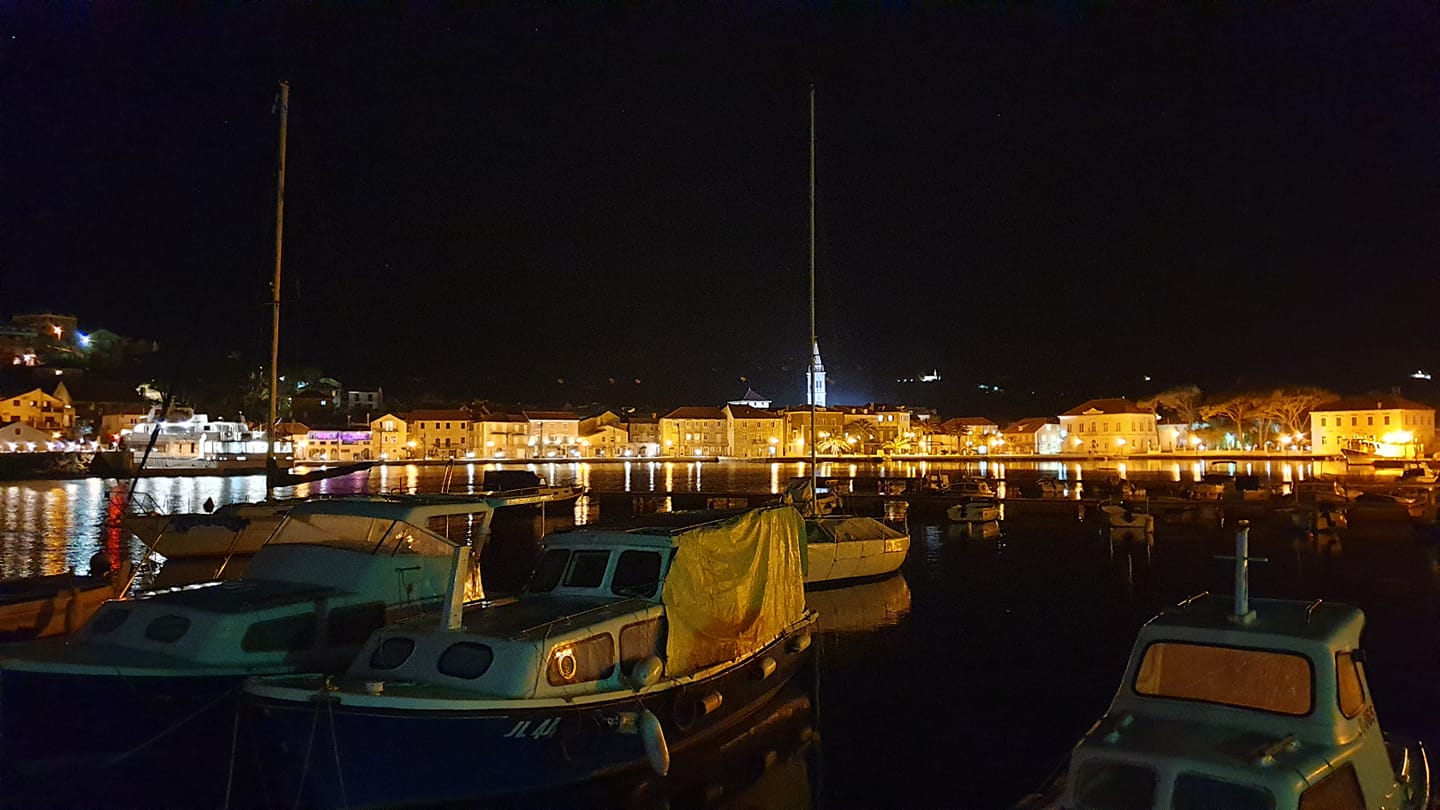
Self-isolation on Hvar means not seeing people. But a little walk around nature at night, when nobody is around, is refreshing indeed. Jelsa in the dead of night, as magical and chilled as when I first discovered it way back in 2002.
Self-isolation on Hvar? So far, so good. I will update in a week or so, from toilet supplies to wild asparagus hunting success.
For the latest on the coronavirus crisis in Croatia, follow the dedicated TCN section.
Coronavirus in Croatia: Issue of Self-Sufficiency Raised by Farmers
As Poslovni Dnevnik writes on the 18th of March, 2020, while Croatia's residents are stepping up food their game in purchasing bulk supplies and standing in line in stores as coronavirus tightens its grip, the Croatian Government is making decisions on limiting the prices of food, hygiene supplies and protective equipment.
Owing to the coronavirus effect on the economy, the issue of self-sufficiency in production is increasingly being raised in Croatia, especially when it comes to food and medicines.
Farmers' associations have often raised this issue in the past, pointing out that domestic production in Croatia is falling year by year. That is why the statistics surrounding about thirty products whose prices have been restricted by the government have been looked at, and the data from last year's published annual report on the state of agriculture for 2018 published by the Ministry of Agriculture has been extracted.
It turned out that Croatia is far more than sufficient when it comes to the production of cereals, meaning that in this segment, production meets the needs of the Croatian market by 117.8 percent, but self-sufficiency in terms of vegetable production, at least back in 2017, amounted to Croatia's needs at the level of a mere 61.9 percent, but not one type of vegetable is doing well enough. For example, domestic potato production covers up to 70 percent of the needs of the Croatian market, cabbage covers almost 86 percent of those needs, and as for onions and garlic, they meet 43 percent of the domestic market's needs.
Self-sufficiency in fruit production amounted to reach only 40.2 percent of all domestic market needs, and only cherry and sour cherry production, with 233.8 percent, was sufficient.
Podravka CEO Marin Pucar says that the market works excellently when it comes to profit, that it is self-regulating in terms of profit, but not so well when it comes to the interests of each individual state and its population.
''As soon as the first signs of the [coronavirus] crisis emerged, both solidarity and the [idea of a] free market disappeared, and everyone is thinking only of themselves. Perhaps this is an opportunity to redefine strategic production, although we should have thought about all that a long time ago. I'm not saying that production can happen without any cost-effectiveness criteria, but the question is whether Podravka would have the production of processed tomatoes it boasts today had that been decided solely on the basis of profit. If Podravka had been taken over by a large international corporation, it might be said that only Vegeta's production of ready-made soups, medicines and baby food would be profitable,'' says Pucar, whose company is constantly reassuring the public that there is enough food and medicine for all.
Pucar says that this is why production takes place in three or four shifts in Podravka, but that the company must also be careful that the emergence of coronavirus among its workers at the plant wouldn't endanger the production of food or medicines, according to a report from Novi List.
''I don't know how many people know that in tomato processing, we cover up to 30 percent of the market and that we're the only one doing that in Croatia. This isn't particularly profitable production, since we're paying higher prices to the subcontractors in Istria than we are to those in Italy, but we've not stopped producing. We're also the only ones to have pickled and canned vegetables,'' Pucar notes.
Asked if the solution might be that consumers prefer to opt for Croatian production, Pucar said that he understands the people who make their final decisions based on price, but pointed out that this is a situation where one really has to discuss self-sufficiency of strategic products.
Make sure to follow our dedicated section for rolling information on coronavirus in Croatia and our business page for more on how Croatian companies are coping with the current crisis.
Vili Beros, Croatia's New Health Minister Bringing Calm, Order to COVID-19 Crisis
March 18, 2020 - Vii Beros, Croatia's Minister of Health, only took up the position a few weeks ago and walked straight into the coronavirus storm. How a Croatian minister has won the hearts and confidence of many.
These are extraordinary times in so many ways, but away from the constant corona media attention, some rather unusual things are happening elsewhere.
The Croatian media, for example, are united in their praise of a government minister. Imagine that!
Ministers - and politicians in general - do not have a great reputation in Croatia (even less than elsewhere, perhaps), and the news has been full of scandals, corruption and other bundles of joy, for as long as I can remember in my 18 years here. Sections of the Croatian media. most notably Index and Telegram, do a great job at making many of these scandals public, but in The Beautiful Croatia, often that has little effect, a topic Lauren Simmonds explored a few weeks ago.
On January 27, 2020, however, the then Health Minister Milan Kujundzic was finally forced to go, the final straw being some undeclared property. As a time when the country's health minister should have been preparing Croatia for the imminent coronavirus threat, most of the attention was instead focused on his private dealings. When Kujundxic was finally gone, I was curious to see who would take his place - the job seemed to be something of a poisoned chalice.
The answer was a man called Vili Beros, who I was surprised to learn was from Jelsa, the town on Hvar where I lived for 13 years. I don't recall meeting Vili Beros, but I was encouraged by the warm words I heard about him from local friends. Tales of his compassion and humanity treating victims of the war, for example.
Beros got straight to work, and together with his team and the other members of the National Civil Protection Headquarters, they have put together their strategy to deal with the crisis. But also - and this is extremely rare in my experience - they have managed to communicate that message clearly, calmly and effectively. A daily press conference has become two daily press conferences, where measures are explained clearly and transparently. Vili Beros has a calming and reassuring manner, leading from the front. In this time of crisis, this is exactly what the Croatian population needs.
And others are noticing. Leading Croatian portal Index.hr, not noted for its love of Croatian politicians, has been among those with warm words for the new health minister. Additionally, Index does a weekly poll of the top 20 most positive and most negative people in Croatia, from different sections of Croatian society. Needless to say, it is not very often that a Croatian politician tops the popularity vote, but this week Vili Beros was number one for a time, before being eclipsed by another star of the crisis response, Alemka Markotic. Index said of Beros:
As soon as he took office, the health minister faced a crisis caused by coronavirus. So far, he has managed it in an unprecedentedly efficient and transparent manner in Croatia. He explains everything he is doing to the layman, understandably and reassuringly.
You can see who else made the top 20 - positive and negative - this week here.
Thank you both, and all those working hard to protect the people of Croatia. These are worrying times, but this calm and coordinated transparency reduces the stress levels considerably.
The Croatian Government has launched an official website to coordinate all official information about coronavirus.
For the latest on the crisis, check out the dedicated TCN coronavirus section.
Liquidity More Than Sufficient to Enable Smooth Cash Flow for Businesses
ZAGREB, March 18, 2020 - Croatian National Bank (HNB) governor Boris Vujčić informed the government on Tuesday that the country possessed very high foreign currency reserves and that system liquidity was more than sufficient to ensure the cash flow for businesses.
Presenting the central bank's measures designed to mitigate the economic consequences of the crisis caused by the outbreak of COVID-19, Vujčić said that he expected a sharp but short contraction of economic activity, primarily as a result of efforts to contain the spread of the coronavirus.
There are forecasts that this situation will be relatively short, lasting three, six or eight months. Of course, the shorter the crisis, the lesser the impact on the economy, the HNB governor said.
Vujčić said that the HNB had prepared three groups of monetary policy measures.
One refers to the stabilisation of the kuna exchange rate and to ensuring foreign currency liquidity. In this context, Vujčić recalled that in the last four interventions, the central bank sold €1.63 billion to commercial banks so as to stabilise the kuna exchange rate at 7.57 per euro.
Foreign currency reserves stand at €19 billion.
The second set of measures focuses on making sure that there is enough kuna liquidity and therefore the central bank has conducted structural and repo operations. On Monday, 750 million kuna was injected into the banking system as a short-term measure, plus 3.8 billion kuna as a long-term measure for a period of five years and at an interest rate of 0.25%.
The third group of measures refers to support to the stability of the state securities market through the purchase of government bonds.
If Croatia were a member of the euro area, some of these measures would not have to be implemented, said Vujčić.
We would also have access to the European system of monetary stability, where €500 billion is available, he said.
More coronavirus news can be found in the Lifestyle section.
Croatia, Austria Coordinate Repatriation of 17 Croatians from Morocco
ZAGREB, March 18, 2020 - The Croatian and Austrian foreign ministries have coordinated the return of 17 Croatian nationals from Marrakesh in Morocco to Vienna, the Croatian ministry said in a press release on Tuesday.
Problems with the repatriation of the Croatian nationals were primarily due to the suspension of flights caused by the coronavirus pandemic.
The Croatian nationals are expected to arrive in Vienna late on Tuesday evening, the Croatian ministry said.
According to current estimates, there are around 30,0000 EU citizens in Morocco.
For all of them, the Croatian Embassy in Morocco, which represents the country currently chairing the Council of the EU, continues to coordinate joint activities of member-countries regarding their repatriation, in cooperation with EU member-countries and the EU Delegation in Rabat, and it continues to provide all diplomatic support.
The embassy also continues to provide round-the-clock consular and other assistance to Croatian nationals in Morocco, the ministry said, thanking Austrian authorities for enabling the return of Croatian nationals to Europe.
More coronavirus news can be found in the Lifestyle section.
Croatia Coronavirus COVID-19 Press Update March 18, 2020: 81 Cases, 12 New
March 18, 2020 – Croatia Health Minister Vili Beros reported that 12 new coronavirus (COVID-19) cases have been confirmed. The total number of cases in Croatia is 81. Details to follow later today. Five patients have recovered.
At 9:00 CET the National Civil Protection Headquarters held a press conference and provided an update the coronavirus in Croatia as reported by Index. Among them are eight doctors from Zagreb, some of whom had recently been skiing in Austria and became infected. Five people have recovered.
Locations of New Croatia Cases Later Today
Minister Beros announced that more than 1,100 tests have been done. The situation is getting worse all over Europe, Beros said. For now, the HQ does not have information on which cities the newly infected are located.
Today, according to government announcements, stricter measures are being introduced and many facilities, cafes, cinemas, theaters, gyms are closing ...
Measures Limiting Movement of Elderly
Minister Davor Bozinovic announced yesterday that the additional measures would apply to the elderly, and it was clear that they would go about limiting their movement almost completely. He also announced the intensification of self-isolation control.
"When it comes to doctors, we are well organized spatially and temporally," Minister Beros said. "For all those who have other problems but are not suspected to have the coronavirus, other health care facilities will provide adequate assistance. Treating chronic conditions is not in question. I want to thank the private sector for being sensitive to this issue," Minister Beros said.
"Mental health professionals are available from 0-24. The ministry is rolling out a wide range of activities and we are doing everything we can to keep the situation under control," concluded Beros.
Markotic: Patients Have Mild Symptoms, No Respirators Needed
Alemka Markotic said that all patients have still mild symptoms and that there aren’t any patients with more severe conditions. "Our doctors who had been in contact with an infected doctor have tested negative," she said.
Minister Beros added that none of the infected people have needed a respirator. "It is certain that this will happen, and that some of the patients will have a more difficult clinical picture. It is very necessary for the older population to be mindful of these measures and the most important thing is to protect them," Beros added.
Capak: Call 113 Instead of 112 Regarding Coronavirus
Krunoslav Capak reminded everyone to call number 113 regarding coronavirus concerns.
“For everything coronavirus-related, please feel free to call with any questions. Eight doctors have been infected. The epidemiological situation is under control," Capak said.
"We are preparing instructions on how hospitals should behave. We will give additional power to the commissions for strict control of transitions from one ward to another, as well as for closing off areas if necessary," he said.
The staff urged the elderly to stay home. "The Red Cross will coordinate deliveries for older people," their representative explained.
"The Red Cross will assist everyone in need with the distribution of food. We are assisting people by a range of activities, both through equipment and logistics. Contact information can be accessed here. It is very important that the headquarters exempt blood donation from the ban on assembly," he emphasized.
Discussion Today on Closing Public Facilities
“Today, we will specifically discuss the closure of facilities. I would not speak about measures to close cafes yet. Today a law is under review which will give additional power to the National Civil Protection Headquarters so we can implement the necessary measures throughout Croatia," Capak said.
Beros also commented on how many people will be infected. According to the table provided by Beroš, it is expected that of the estimated 5 percent to be infected in Croatia, 140 of them will fall into the group of severely ill, while 80 percent (2261) will be in the group of mildly ill. Fifteen percent of the population, which is 425, would fall within the category of medium-severe symptoms. In Croatia, 2,826 people are expected to become infected during the coronavirus epidemic.
"That's an earlier estimate," Beros explained. When asked if new estimates for the infected were higher, he said "not significantly."
Seniors: Stay Home, Delivery Help Available
The Red Cross has issued instructions for seniors to share via email and to publish on their website. More information here.
"The approach is simple, that there will be direct contact between the delivery person and the elderly, that the contact is short, and that everyone will regularly wash their hands," it was noted. "We are open to anyone who wants to help. It's just important that you do it safely."
132 People Have Violated Self-Isolation
In 132 cases, citizens were caught violating a measure of self-isolation.
"Police and sanitary inspection are doing their job well regarding enforcement of self-isolation orders. We have received 779 reports and 132 people have been caught not complying with these measures,” Capak said.
Follow our dedicated page on the coronavirus (COVID-19) in Croatia and watch for our daily update at 14:00 CET. The Croatian Government has also launched a website for information on the coronavirus (with map of cases) here.
COVID-19 in Croatia: Government Launches Official Koronavirus.hr Info Website
March 18, 2020 - In an effort to coordinate information about the coronavirus crisis, the Croatian Government has launched a dedicated website, Koronavirus.hr.
A great and very timely resource has been launched by the Croatian Government in these times of great COVID-19 uncertainty a dedicated website about all relevant issues related to the crisis - you can visit Koronavirus.hr here.
The website, which is only in Croatian (but Google Translate is your friend) has the following features:
- A map of the current state of affairs with the virus - cases, deaths (none so far) and recoveries by location in Croatia, as well as details in neighbouring countries, plus the epicentre of the virus in Europe, Italy. TCN was the first website to launch a corona map of Croatia 9 days ago, and we are delighted that there is now an official map, which we will be using from now on in our daily updates.
- What you need to know - sections on the illness, prevention, travel, school and going to work.
- The latest developments.
- Information on government measures taken.
- FAQs, coronavirus myths and realities, and the chronology of the development of an epidemic.
- Important contact numbers.
It looks like a great resource, easy to use, and one which should be an important reference point for people looking for the latest official information about the coronavirus situation in Croatia.
TCN will endeavour to make parts of the site available in English, as our limited resources allow.
Visit Koronavirus.hr here.
And for the very latest coverage on TCN, follow the dedicated coronavirus section here.
Due to Coronavirus, MPs to Sit in Every Other Bench, Galleries
ZAGREB, March 17, 2020 - In order to prevent the spreading of the novel coronavirus, the Croatian parliament will organise its plenary sessions in line with the national civil protection authority's recommendations on minimum personal distance, sources at the parliament said on Tuesday without specifying details.
Unofficial sources, however, say that a new seating arrangement has been defined for Wednesday, when the parliament will reconvene.
To make sure that there is room in the parliament chamber for each of the 151 members of parliament and that they sit at the prescribed distance from one another, they will sit in every other bench, at seats that are usually occupied by government members and at side seats and seats in all three galleries.
MPs will be given a precise seating order on Tuesday afternoon.
On Wednesday the parliament will vote on a proposal to add a government-sponsored set of bills to the session's agenda on assistance to the economic sector and amendments to the Civil Protection Act.
Since all deputies will not be physically able to vote electronically due to the new seating order, electronic voting will be combined with voting by a show of hands.
The parliament has already given instructions to media outlets regarding reporters' presence in the parliament building and internal protocols are being made to prevent the spreading of the coronavirus.
More coronavirus news can be found in the Lifestyle section.
Jadrolinija Kindly Asks Passengers to Book Tickets Online or Via App
The coronavirus outbreak is having an astounding effect on the global economy and the Croatian economy, of which the strongest branch is of course tourism, and Jadrolinija issues a fair request to its customers.
Jadrolinija is a large Croatian ferry company which works to transport countless locals and tourists to destinations along the coast, between islands and from the mainland to the islands every year, with the height of its traffic naturally being during the warm summer months - the height of the Croatian tourist season.
Coronavirus is making life difficult for almost everyone, and as Morski writes on the 17th of March, 2020, Jadrolinija has kindly asked its customers to refrain from coming to purchase tickets in person but rather to purchase them online or via the ferry company's own app - mJadrolinija.
''We'd like to ask our passengers to please purchase their tickets online or via the mJadrolinija mobile application (app) in order to try to stop the spread of coronavirus. We'd like to ask passengers who are unable to use the digital channels of purchase to use cash as a payment method as little as possible and that they instead use contactless cards to pay,'' reads a statement released this morning by Jadrolinija.
Make sure to follow our dedicated section for rolling information in English about coronavirus in Croatia. We cover updates on travel, borders, entry and exit requirements and much more as soon as changes come in.
For more on travel to and around Croatia, follow our travel page.

